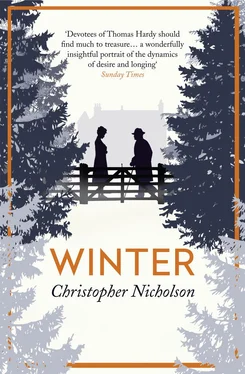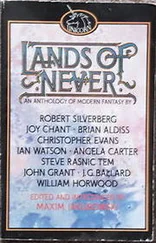She was by the fire in the drawing room, tickling Wessex, who was flat on his back with his paws in the air.
‘How good of you to come.’
She straightened, smiling.
‘I am afraid Mrs. Hardy is unwell, but she sends her best wishes.’
She was wearing a green skirt with a white blouse and long grey cardigan, and despite the best efforts of the wind not one hair of her coiffure was out of place.
The old man drew the curtains. ‘And your baby is in good health?’ was his next inquiry, for he knew how women always loved to be asked about their children. ‘What is her name? Diana, is it not?’
She agreed that it was. ‘She is very well, though she doesn’t sleep very regularly at night. She always wakes up about two o’clock, bright as a daisy, which is a little inconvenient.’
‘What do you do when she doesn’t sleep?’
‘I sing to her, but it doesn’t always work. Sometimes I bring her into my bed, but she kicks.’
‘I am sure she is very beautiful, if she is anything like her mother.’ His success in managing this compliment delighted him enormously. ‘You should bring her here some time. I should love to see her. Mrs. Hardy and I never see enough children,’ he added a trifle wistfully.
After a quick knock the two maids came into the room together, each bearing a tray – one with a teapot and crockery, the other with a plate of tiny white sandwiches from which the crusts had been cut. They put the trays down on a small table. With Florence not there, Gertie played the part of hostess and poured out the tea.
Once they were settled, they began to discuss theatrical matters. Gertie was a member of a local amateur dramatic company, and was currently playing the leading role in a play that would be performed in less than three weeks’ time in the town’s Corn Exchange. The old man was intimately involved, being the author of the play, a dramatic version of a novel that he had written some thirty years earlier, and he asked her a series of questions: how rehearsals were going, whether the actors and actresses knew their lines, and whether any of them had seen their costumes yet. Her answers were that, in general, all was going well – although one of the actors was growing a moustache that was still not particularly convincing. The old man, amused by this, stroked his own moustache, and sipped his tea. Then he came to the point for which he had been waiting.
‘Over the years,’ he said, ‘various people in the theatre business have asked permission to stage the play in London. I have always been rather opposed to such an idea, but lately I have been approached by Mr. Frederick Harrison – the manager of the Haymarket Theatre. The Haymarket is one of the best theatres in London, and Mr. Harrison seems very enthusiastic.’
He was aware of her attentiveness. She was sitting on the sofa, very upright, with her cup of tea on her knees, but her eyes never left his face.
‘Of course, if the play is to end up on the London stage, the question of who should play your part – the title role, the part of Tess – arises. There are a number of well-known actresses who have expressed considerable interest. However, some while ago, if I remember rightly, you asked me about the possibility of acting in a professional capacity, and I feel that you should have first refusal.’
His voice could not have been more cautious, but she answered immediately that she would love to play the part.
‘It is very uncertain,’ he told her. ‘Nothing is definite. The reviews may not be good enough. But Mr. Harrison’s plan, as I understand it, is to put on a production next spring, or in the early summer.’
‘What of the rest of the cast?’
‘They will be professional actors, of course.’
She seemed momentarily overwhelmed. Her lips were slightly parted; her teeth shone. He could sense the excitement running through her body. A slight flush even spread over her face.
‘You must think about it carefully,’ he advised. ‘Talk to your husband. It would involve staying in London for some time.’
‘O, but my husband won’t mind, not at all!’
‘Perhaps. But there is also your baby to consider. If, after consideration, you are sure you would like to do it, I will write to Mr. Harrison. I am neither encouraging nor discouraging you, although I can see you on the London stage. You would be a great success.’
The old man believed this sincerely. She was an actress of great expressive talent, and not only in his own estimation: London critics who had seen her perform in previous local productions had showered her with praise.
‘I don’t know how to thank you,’ she said.
He modestly disclaimed all influence. ‘There is no need to thank me – it is nothing to do with me, and it may come to nothing.’
They talked of it for some time. Seeing how much he had raised her hopes, he repeatedly counselled caution, telling her to look at it from all aspects. Acting in a professional company would, he said, be very different to acting with amateurs and he would entirely understand it if in the end she decided against going to London. ‘As I say, there are other actresses willing to play the part – including Sybil Thorndike, I believe,’ he added dryly, unable to resist dropping the name of one of the most famous actresses of the day into the conversation.
Gertie was barely listening in her excitement.
‘As early as the spring? How long will it run for?’
‘I imagine that depends on its success. You must meet Mr. Harrison. He may well come down to see the play here – Wessex! Wessex, do stop that! Stop dribbling!’ he said, for the dog was pestering her for a sandwich.
‘May I give him one?’ she asked.
‘If you like.’
He watched as she held out a sandwich. Wessex took it from her fingers with remarkable delicacy, given his usual propensity to snatch. She smiled.
‘I believe you spoil him.’
‘Ah, he is an old dog. He is too old to be spoiled.’ The old man was vaguely conscious of a desire to be in Wessex’s position, licking her fingers. ‘He likes you,’ he said.
‘I feel honoured,’ she said, ‘even if it is cupboard love.’
He tossed out another compliment. ‘You are a favourite, Gertie. He likes you more than anyone else.’
She left a little later, thanking him again as she put on her coat. From the porch he watched as she disappeared into the darkness.
Once he had shut the door the house seemed unusually quiet, as if reflecting on what had passed. He stood by the grandfather clock, listening to its slow, measured ticks and the intervening silences, frowning slightly. He was conscious that he might have started a fire that would be hard to control. Should he have waited until the play had been performed at the Corn Exchange? What if it received poor reviews and Mr. Harrison changed his mind?
Then he remembered his wife. Reluctantly he went up the stairs to her bedroom. Florence was lying on her bed, with the curtains undrawn and the lamp on the bedside table casting such a feeble light that only her head and shoulders were visible in the general darkness. Her back was turned to him, and as he stood in the doorway and regarded her still shape he wondered if she was asleep. But she became aware of his presence. She turned with opened eyes.
‘Has she gone at last? She stayed a very long time; it’s nearly six o’clock. You must be worn out. Did she bring her baby?’
‘No.’
‘I couldn’t face meeting her. She is always so healthy. I feel unwell even seeing her.’
The old man gave a grunt. ‘She is much younger than you.’
This was true, for Florence was a score of years older than Gertie, but it was also true that Florence’s health was far from good. She had a weak constitution and suffered not only from headaches and recurrent toothache, but also from neuritis, a condition caused by undernourished nerve endings, for which she took some large pills manufactured by a chemist in the town. Nor was this all: less than a month earlier, in London, she had had a surgical operation to remove a lump from her neck. It was to hide the scar that she had taken to wearing the fox stole, an object that the old man had never much liked.
Читать дальше












